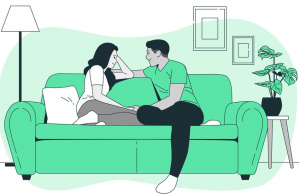Is Counseling Right for You? Free Self-Assessment
By Prapoorna M
Last Updated: June 11, 2024
Deciding whether to start counseling can be a significant and sometimes daunting step. It’s common to have doubts and questions about whether it’s the right time for you or if counseling will truly help. You might wonder if your problems are “bad enough” to warrant professional help or worry about the commitment and what it might entail.
The goal of this article is to guide you through a self-assessment process to help determine if counseling is right for you. We’ll also provide practical tips for discussing your decision with others and addressing common concerns you may have. By the end, you’ll have a clearer understanding of how counseling can benefit you and how to take the next steps confidently.
Book Your Marriage Counselling Now
Self-Assessment: Is Counseling Right for You?
Recognizing Signs You Might Need Counseling
Emotional Overwhelm
Do you often feel like you have too much on your plate? Feeling overwhelmed can make it hard to breathe, rest, or enjoy life. If you constantly feel stressed and unable to manage your emotions, it might be a sign that counseling could help you find better ways to cope.
Persistent Fatigue
Are you always tired, struggling to get out of bed, or sleeping too much? Fatigue can often be a symptom of underlying mental health issues like depression or anxiety. If you’re feeling exhausted despite getting enough rest, talking to a therapist can help identify and address the root causes.
Unmanageable Emotions
Do you experience intense emotions like anger, anxiety, or sadness that you can’t control? If these feelings are interfering with your daily life, it’s a good indicator that you might benefit from counseling. A therapist can help you develop strategies to manage these emotions more effectively.
Negative Coping Mechanisms
Are you relying on unhealthy ways to cope, such as overeating, drinking, or avoiding problems? Negative coping mechanisms can provide temporary relief but often lead to bigger issues in the long run. Counseling can help you find healthier ways to deal with stress and emotions.
Evaluating Life Impact
Quality of Life
Has your enjoyment of life decreased? If you’ve lost interest in activities you once enjoyed, it might be time to consider counseling. A therapist can help you explore why your interests have waned and how to reignite your passion for life.
Relationships
Are your relationships strained? Difficulty in maintaining healthy relationships can be a sign that you need external help. Whether it’s trouble communicating, fear of confrontation, or attachment issues, counseling can provide tools and insights to improve your interactions with others.
Work and Productivity
Is your emotional state affecting your performance at work? If stress, anxiety, or depression is impacting your productivity, counseling can help. A therapist can assist you in managing your emotions better, leading to improved focus and efficiency.
Tips for Discussing Counseling
Starting the Conversation
Open Up Gradually
Talking about the possibility of counseling can be challenging. It’s okay to start small. Begin by sharing your thoughts with a trusted friend or family member. Let them know you’re considering counseling and why. Opening up gradually can help you feel more comfortable and supported as you move towards making a decision.
Use a Trial Session
Many therapists offer initial trial sessions. This can be a great way to ease into counseling. Use this opportunity to see if you feel comfortable with the therapist and their approach. A trial session can help you get a feel for what counseling might be like without committing to a long-term plan right away.
Addressing Common Concerns
Stranger Anxiety
It’s normal to feel hesitant about sharing personal details with a stranger. Remember, therapists are trained professionals who provide a safe, confidential space for you to talk. They are there to listen without judgment and help you work through your concerns. Over time, you may find it easier to open up and discuss your feelings.
Commitment Worries
Worried about the time and effort required for counseling? Therapy is a commitment, but it’s important to remember that it’s an investment in your well-being. Discuss your availability and concerns with your therapist. Many offer flexible scheduling options, including online sessions, to accommodate your needs.
Severity of Problems
You might wonder if your issues are “serious enough” for counseling. The truth is, if something is bothering you and affecting your life, it’s worth addressing. Therapy isn’t just for severe issues; it’s for anyone who wants to improve their mental health and well-being.
Practical Considerations
Finding the Right Therapist
Finding a therapist who is a good fit for you is crucial. Look for someone who specializes in the areas you want to address. You can use resources like Wellness Hub to find therapists with the right expertise. Reading reviews and possibly meeting a few therapists can help you make an informed choice.
Affordability and Accessibility
Worried about the cost of counseling? Many therapists offer sliding scale fees based on your income. Additionally, online therapy options can be more affordable and convenient. Check if your insurance covers mental health services or explore community resources that might provide financial assistance.
Types of Therapy and Duration
| Type of Therapy | Description | Typical Duration |
|---|---|---|
| Cognitive Behavioral Therapy (CBT) | Focuses on changing negative thought patterns and behaviors. Helps in managing anxiety, depression, and other mental health issues by developing practical coping strategies. | Short-term (8-20 sessions) |
| Psychoanalysis | Focuses on changing negative thought patterns and behaviors. It helps in managing anxiety, depression, and other mental health issues by developing practical coping strategies. | Explores deep-seated issues and the unconscious mind. It aims to uncover underlying motivations and conflicts from past experiences affecting current behavior. |
| Solution-Focused Therapy | Targets specific problems and develops practical solutions. Emphasizes the present and future, setting goals, and finding ways to achieve them. | Short-term (5-10 sessions) |
| Mindfulness-Based Therapy | Incorporates mindfulness practices to increase awareness and acceptance of the present moment. Helps manage stress, anxiety, and depression through techniques like meditation and breathing exercises. | Varies (short-term to long-term) |
Understanding the Benefits of Counseling
Counseling offers numerous benefits that can significantly improve your mental health and overall well-being. Let’s explore some of the key advantages of engaging in therapy.
Personal Growth
Increased Self-Awareness
Counseling helps you gain deeper insights into your thoughts, behaviors, and emotions. By understanding the underlying reasons for your actions, you can make more informed decisions and develop a clearer sense of self. This increased self-awareness can lead to personal growth and a more fulfilling life.
Better Relationships
Therapy can improve your relationships by enhancing your communication skills and helping you set healthy boundaries. Whether it’s with family, friends, or partners, better relationships can lead to a more supportive and connected life. A therapist can guide you in understanding relationship patterns and working through issues that may be causing strain.
Coping Strategies
Stress Management
Life is full of stressors, and managing them effectively is crucial for maintaining mental health. Counseling provides you with practical tools and techniques to handle stress in healthier ways. From mindfulness exercises to problem-solving strategies, a therapist can help you find what works best for you.
Emotional Regulation
Unmanageable emotions can disrupt your daily life. Therapy teaches you how to regulate emotions like anger, anxiety, and sadness. By developing emotional regulation skills, you can respond to situations more calmly and thoughtfully, leading to a more balanced and peaceful life.
Long-Term Improvements
Sustainable Change
One of the most significant benefits of counseling is the ability to create lasting changes in your life. Unlike temporary fixes, therapy equips you with skills and insights that continue to benefit you long after your sessions end. This sustainable change can help you navigate future challenges more effectively.
Conclusion
Deciding to seek counseling is a big step toward improving your mental health. Counseling offers many benefits, like personal growth, better relationships, and effective stress management. If you feel overwhelmed or struggle with emotions, therapy can provide the tools and support you need to handle life’s challenges better.
If you are ready to start, Wellness Hub has resources to help you find the right therapist. Whether you prefer in-person sessions or online therapy, Wellness Hub can guide you in making the best choice. Remember, seeking help shows strength and is a positive step towards a happier, healthier life. Don’t hesitate to reach out and explore how counseling can benefit you.
Frequently Asked Questions:
1. How do I know if counseling is right for me?
If you’re feeling overwhelmed, struggling with emotions, or facing difficulties in your personal or professional life, counseling might be beneficial. A self-assessment can help you identify if therapy could be the right step for you.
2. What are the signs that I need counseling?
Signs that you might need counseling include persistent fatigue, unmanageable emotions, negative coping mechanisms, and a decline in quality of life, relationships, or work productivity.
3. How can I assess my need for counseling?
You can assess your need for counseling by evaluating your emotional state, stress levels, coping strategies, and the impact of these factors on your daily life. If these issues significantly affect you, it might be time to seek help.
4. What should I consider before starting counseling?
Before starting counseling, consider your goals, the type of therapy you prefer, the commitment required, and any concerns you may have. Finding the right therapist who matches your needs is also crucial.
5. How do I discuss counseling with a partner or family member?
Start the conversation gradually by sharing your thoughts and feelings about considering counseling. Use trial sessions to ease into the process and address any common concerns like stranger anxiety or commitment worries.
6. What are the benefits of counseling?
Counseling offers numerous benefits, including increased self-awareness, better relationships, effective stress management, emotional regulation, and long-term improvements in mental health.
7. How do I find the right therapist?
Finding the right therapist involves looking for someone who specializes in the areas you want to address. Use resources like Wellness Hub to find therapists with the expertise you need.
8. Is therapy affordable and accessible?
Many therapists offer sliding scale fees based on your income, and online therapy options can be more affordable and convenient. Check if your insurance covers mental health services or explore community resources for financial assistance.
9. Can I start with a trial session?
Yes, many therapists offer initial trial sessions. This allows you to see if you feel comfortable with the therapist and their approach before committing to a longer-term plan.
10. What if I don’t have severe issues?
You don’t need to have severe issues to benefit from counseling. If something is bothering you and affecting your well-being, therapy can help improve your mental health and quality of life.
About the Author:
Prapoorna Mangalampalli
M.Sc., M.A., (Dual Masters in Psychology & English) – Counselor (6+ years of experience)
Prapoorna, with dual Master’s degrees in Psychology and English and over 6 years of experience, elevates human experiences through insightful counseling. She excels in online, marital, relationship, child, family, and career counseling. At Wellness Hub, she thrives in a team environment, valuing innovation, compassion, and client success.
Connect with Prapoorna to find your voice and build a brighter future.
Book your Free Consultation Today
Parent/Caregiver Info:
Client’s Details:
* Error Message









